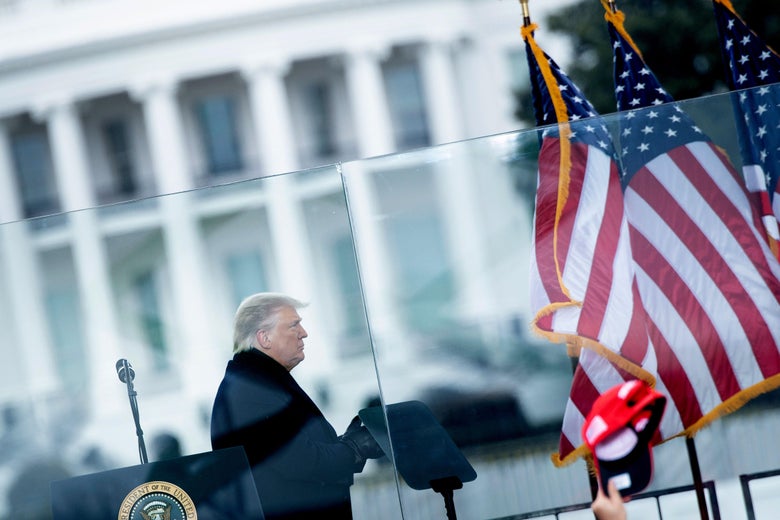
As the House Select Committee’s inquiry into the Jan. 6 Capitol riot progressed this week with subpoenas for some of the far-right groups that took part in the attack, the Department of Justice’s inaction against political leaders who inspired the assault is becoming harder to ignore. Indeed, as commentators have noted, it’s been nearly a year since the assault and not a single figure in Donald Trump’s orbit has faced any sort of criminal accountability. There are ample grounds to probe Trump and his cronies for their efforts to overturn U.S. democracy—and potentially charge them with crimes—and the Attorney General Merrick Garland should start immediately with a fairly straightforward conspiracy case.
Numerous investigations and reports have produced substantial evidence of probable cause that Trump and his operatives violated at least one criminal statute, 18 U.S.C. Section 241. That statute makes it a federal crime for “two or more persons” to conspire to prevent anyone from exercising or enjoying any right or privilege secured by the Constitution or laws of the U.S., and it makes such crime punishable by fine, or imprisonment up to ten years.
The Supreme Court has stressed that Section 241 contains “sweeping general words” and directed courts to give the provision “a sweep as broad as its language.” In United States v. Classic it established that the statute protects not only the right to vote but the right to have one’s vote properly counted. Classic upheld an indictment of officials who sought to aid one candidate by refusing to count votes cast for his opponent.
The broad language of Section 241 clearly encompasses the actions of those involved in Trump’s coup attempt, and the Court’s precedents support that conclusion. Evidence currently available shows that the conspirators agreed to a common scheme to overthrow the results of the 2020 presidential election, took innumerable acts designed to accomplish that goal, and intended thereby to effectively deprive millions of voters in half a dozen states—and the rest of the 81 million Americans who voted for Joe Biden—of their right to vote and have their votes properly counted.
In Anderson v. U.S. the Court explicitly held that Section 241 reaches conspiracies designed “to dilute the value of votes of qualified voters.” It requires only an intent to prevent votes from being “given full value and effect,” an intent that includes an intent “to have false votes cast.” Evidence suggests that Trump and his supporters attempted exactly that in Georgia. They pressured local officials to somehow, some way magically “find” 11,780 additional votes to give Trump victory there and negate the votes of nearly two and a half million Georgia voters.
While the Constitution does not directly confer the right to vote, the equal protection components of the Fifth and 14th Amendments protect that right from those who would conspire to negate lawful votes and cheat the ballot box. The clauses require action under color of law as well as an intent to violate them, and here both of those requirements are met. Trump and his co-conspirators exploited their governmental authority in attempting to bulldoze state officials and the vice president to join them in effectuating their scheme. Similarly, their public and private actions and statements reveal their driving intent to deny the import of millions of votes in order to overthrow the results of the presidential election. Trump’s cover story—his bogus alibi of Democratic voter fraud—is simply not credible and deserves no weight given overwhelming evidence and dozens of judicial findings that no such fraud existed.
A final point is equally clear. A conspiracy need not succeed to be criminal. The fact that Trump’s conspiracy failed does not affect its legally criminal nature.
Given the law under Section 241, ample evidence of probable cause, and the conspiracy’s grave threat to American constitutional government, DOJ has no excuse for failing to immediately launch an exhaustive investigation into all aspects of the plot. The department’s core duty is to protect the integrity of the law and the security of our constitutional system, and it should begin to honor that duty immediately.
A DOJ investigation is also essential for an immediately compelling practical reason. The Trump conspirators are attempting to stall and ultimately negate the efforts of the House Select Committee investigating their plot, and their only hope of preventing full public disclosure of their wrongdoing is deception and delay. They believe that, if they can succeed in impeding the House investigation for another year, Republicans will take over the House in 2022, kill the investigation, and bury its findings. Given the operation of the federal courts, their ploy may well succeed. Finally, the Trump plotters are still at it. On Tuesday, nearly 200 Trump-backing state legislators ludicrously called for the 2020 election to be “decertified” and overturned by the House of Representatives, a notion that can be found nowhere in the U.S. Constitution or law. The former president, meanwhile, is suggesting that another presidential run is imminent and has made overturning the last election his central theme. He will surely try to deprive the rights of tens of millions of American voters again if given the slightest chance.
A DOJ investigation is the only governmental option capable of surely and effectively countering the delay tactics being used against the Jan. 6 committee, ensuring that the whole truth comes out, and safeguarding the nation’s constitutional system.
"use" - Google News
November 25, 2021 at 12:13AM
https://ift.tt/3l4JBL0
The One Obvious Statute the DOJ Could Use to Prosecute Trump for Jan. 6 - Slate Magazine
"use" - Google News
https://ift.tt/2P05tHQ
https://ift.tt/2YCP29R
Bagikan Berita Ini














0 Response to "The One Obvious Statute the DOJ Could Use to Prosecute Trump for Jan. 6 - Slate Magazine"
Post a Comment